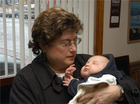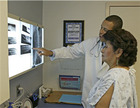Creating a Family Health History
Promoting Family Health
Finding Out about Your Disease Risk
A family health history can help you and your family members know if any of you may face an increased risk of a disease. Share your family health history with your doctor or other health care professional to find out about your risk of disease.
Your health care professional might ask the following questions.
- Is there a family history of a known genetic disease?
- Are many family members affected by the same or related disease?
- Does a family's ancestry make certain diseases more likely?
- Did any family members develop a disease earlier than expected?
A health care professional can sometimes determine a person's level of disease risk. The level of risk depends partly on the number and relationship of relatives with the disease as well as how old they were when they got the disease.
What Your Health Care Professional May Recommend
If you are at risk of a disease that runs in your family, your doctor may recommend steps to help lower that risk. These steps may include lifestyle changes, such as exercising more or eating a healthier diet. A health care professional might also suggest regular tests to look for signs of disease or medications to help prevent a disease.
How is Genetic Testing Done?
If a doctor sees signs of a disease in your family, he or she may suggest a genetic test. In this type of test, a small sample of blood, saliva, or tissue is taken to examine a person' genes. A specially trained doctor or counselor can tell if someone has a genetic mutation and what that means. In general, a mutation makes it more likely that a person or a person's child can develop a particular disease.
When to Ask About Genetic Testing
You may want to ask your health care professional about genetic testing if you:
- have a family history of a rare, inherited disease, such as cystic fibrosis or sickle cell anemia
- have a history of more common diseases, such as cancer or heart disease, that affect many relatives in several generations of your family
- have more than one close relative who developed common diseases earlier than normal
- come from a population group with a higher risk of a specific inherited disease.
Sometimes, genetic testing can detect risk for diseases that may be preventable or treatable. This type of testing is available for hundreds of conditions, including less common types of breast, ovarian, and colon cancer.
Many genetic diseases occur in people born with a mutated gene. If a couple in your family is planning to have a child, you might ask them if they want to know about any genetic diseases that run in the family. Health care professionals often can test for a couple's risk of having a baby with a genetic disease either before pregnancy or during pregnancy, or shortly after the baby is born.
A Valuable Tool
A family health history is an heirloom. Pass it on to your children. Update it when new health conditions, births, and deaths occur. Find out more about the diseases that run in your family. Creating a family health history can help your loved ones live longer and better lives.





